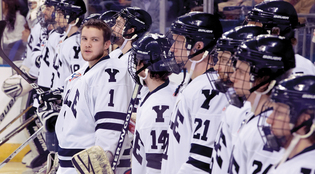 loading
loading
Ice age Bob HandelmanOne of the main differences between last season and this one was the emergence of Ryan Rondeau ’11 (above, wearing no. 1) as a dependable starting goalie. Rondeau, who posted a school-record six shutouts this season, says a summer working with a sports psychologist helped him learn to tune out distractions. View full imageThe Bulldogs had almost no time to bask in their thrilling overtime win over Air Force in their NCAA tournament opener on March 25. They had a game less than 24 hours away against Minnesota–Duluth, with a trip to the Frozen Four at stake—a berth that would have represented another new pinnacle for Yale’s program. In fact, Denny Kearney ’11 (brother, incidentally, of the U.S. Olympic gold-medal mogul skier Hannah Kearney) described his team’s reaction to the winning goal by Chad Ziegler ’12 as “a big sigh of relief,” which is not to diminish the fact that it was among the biggest goals any Yalie has ever scored. Not far down that list is the goal O’Neill knocked in to put Yale in front, 1–0, in the second period of that same game, a goal that gave Allain yet another reason to state after the game that the undersized, gritty O’Neill was “the heart and soul of our team.” With that said, it is impossible to overstate the impact of what happened in the second period against Minnesota–Duluth, the team Yale had knocked from the national number-one spot back in December. Before a packed house of 7,861 at Bridgeport’s Arena at Harbor Yard, all but a handful cheering for Yale, the Elis started flat and sloppy, with a slew of foolhardy penalties helping to put them in a 3–0 hole. With the team in desperate need of a spark, O’Neill provided it by scoring on a power play 11:30 into the second period. After only eight more seconds had been played, O’Neill was thrown out of the game, deemed to have struck an opponent in the head on a crushing hit at center ice that, upon review of the replay, probably should not have been a penalty at all, let alone a major penalty and ejection from the game. “In hindsight, the game was over then,” Allain said after the game, and after Martin and company had click-clacked somberly out of the interview room. “We didn’t feel that way at the time, because we’re fighting our tails off to the final buzzer, but looking back now, it was over right there.” Two Minnesota–Duluth goals on the resulting advantage in manpower made the score 5–1, and in spite of an eminently admirable effort that brought Yale within 5–3 with just less than seven minutes left, this remarkable season was finished, too. For the second straight year, Rondeau watched the end of his NCAA tournament from the bench, replaced for the third period by Nick Maricic ’13. It was a move Allain said was an attempt to spark his team, because “it became clear it wasn’t going to be Ryan’s night.” But it was one that also seemed to have an eye toward 2011–12, giving a taste of the tournament to next season’s frontrunner for the starting goaltender’s job. “Sure, there were disappointments at the end, but this season—it’s a credit not just to the players but to Keith Allain for bringing life into the program,” Brooke says. “I can tell you firsthand, from the Yale community, the hockey alumni, that this was an exciting, inspiring thing to watch, and we look forward to watching it continue as a rebirth of Yale hockey, and maybe Yale athletics as a whole.” No matter what direction the program takes from here, to a Yale hockey fan, 2010–11 will be a season that never fades. For now, at least, the unfinished business remains, too.
The comment period has expired.
|
|